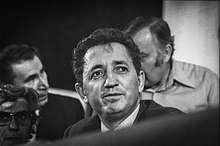Edmond Maire
Edmond Maire (French pronunciation: [ɛdmɔ̃ mɛːʁ]; 24 January 1931 – 1 October 2017) was a French labor union leader. He was the secretary general of the French Democratic Confederation of Labour (CFDT) from 1971 to 1988. He was dismissive of strike actions and supported a more equal division of labour.
Edmond Maire | |
|---|---|
 Edmond Maire in 1978 | |
| General Secretary of the CFDT | |
| In office 1971–1988 | |
| Preceded by | Eugène Descamps |
| Succeeded by | Jean Kaspar |
| Personal details | |
| Born | 24 January 1931 Épinay-sur-Seine, France |
| Died | 1 October 2017 (aged 86) France |
| Nationality | French |
| Children | Jacques Maire |
| Education | Lycée Jacques-Decour |
Early life
Edmond Maire was born on 24 January 1931 in Épinay-sur-Seine near Paris.[1][2][3] His father was a railroad employee for the SNCF at the Gare du Nord, and his mother was a housewife.[1] He was raised as a devout Roman Catholic alongside six siblings.[1]
Maire was educated at the Collège-lycée Jacques-Decour in Paris and did not go to university.[1] He began working at 18 and took evening classes in chemistry at the Conservatoire national des arts et métiers.[1] He subsequently did his military service.[1]
Career
Maire began his career as a chemist for Pechiney in Aubervilliers near Paris.[1] He quit his job to focus on activism. After he retired from the CFDT, he became the chief executive of Villages Vacances Familles, a chain of affordable holiday villages later known as Belambra Clubs.[2]
Activism
Maire first joined the French Confederation of Christian Workers in 1954.[1][2] In 1964, he was a co-founder of a secular splinter group, the French Democratic Confederation of Labour.[3][2] Maire succeeded Eugène Descamps as the secretary general of the CFDT from 1971 to 1988.[1][2][3] He took on a more centrist approach, which led more left-wing labour leaders like Jacques Julliard to criticize him.[4] For example, Maire dismissed strike actions as "old labour mythology."[4] Instead, he was a proponent of a more equal division of labour.[4] In 1981, he complained that French public intellectuals were not sufficiently supportive of his efforts.[5] He was succeeded by Jean Kaspar.[2][3]
Maire joined the Socialist Party in 1974.[2][2] He was close to Pierre Mendès France, Michel Rocard and Jacques Delors.[5] He was a supporter of the 35-hour workweek passed by the Socialist government under Prime Minister Lionel Jospin in 2000.[2]
Death and legacy
Maire died on 1 October 2017.[1][2][3] One of his sons, Jacques Maire, is a member of the National Assembly for En Marche![3]
Upon his death, Muriel Pénicaud, the French Minister of Labour, tweeted that Maire "transformed and inspired industrial relations."[3]
References
- Noblecourt, Michel (1 October 2017). "Mort d'Edmond Maire, ancien secrétaire général de la CFDT". Le Monde. Retrieved 1 October 2017.
- "Décès d'Edmond Maire, ancien secrétaire général de la CFDT". Le Figaro. 1 October 2017. Retrieved 1 October 2017.
- "Décès d'Edmond Maire, ancien secrétaire général de la CFDT". Libération. 1 October 2017. Retrieved 1 October 2017.
- Béroud, Sophie; Mouriaux, René (2001). "La CFDT en quête de refondation sociale". mouvements. 2 (14): 83–89. doi:10.3917/mouv.014.0083 – via Cairn.info.
- Daniel, Jean (1983). "L'Heure des intellectuels". Le Débat. 5 (27): 168–180. doi:10.3917/deba.027.0168 – via Cairn.info.